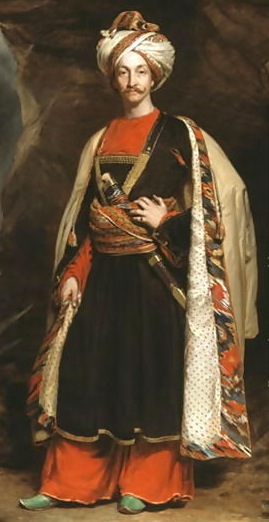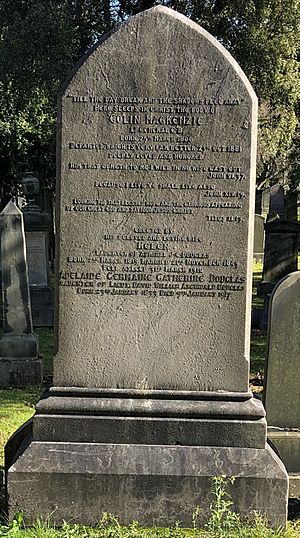Colin Mackenzie (Indian Army officer) facts for kids
Quick facts for kids
Colin Mackenzie
C.B.
|
|
|---|---|

Colin Mackenzie in Afghan dress, by James Sant, c 1842 (National Army Museum)
|
|
| Born | 26 March 1806 London, England, United Kingdom |
| Died | 22 October 1881 (aged 75) Edinburgh, Scotland, United Kingdom |
| Buried |
Grange Cemetery, Edinburgh
|
| Allegiance | |
| Service/ |
Madras Army |
| Rank | Lieutenant-General |
| Unit | 48th Madras native infantry |
| Commands held | 4th Sikh regiment; Ellichpúr division |
| Battles/wars |
See battles
|
| Awards | Kábul medal |
Lieutenant general Colin Mackenzie (born March 25, 1806 – died October 22, 1881) was a British army officer. He served in the Madras Army in India. He was also a political officer in Afghanistan. This meant he worked to manage relationships between the British and local rulers.
Contents
Early Life and Career
Colin Mackenzie was born in London, England, on March 25, 1806. He was one of the younger sons of Kenneth Francis Mackenzie. His father was a lawyer who lost a lot of money during wars with France. Colin went to several schools, including Dollar Academy. In 1825, he joined the East India Company as an infantry cadet in Madras (now Chennai, India).
In 1834, Mackenzie served in the Coorg campaign. This was a military operation in a region called Coorg. He was praised for his work during this time. Two years later, in 1836, he joined an expedition against pirates. This happened in the Straits of Malacca, a busy sea route. Even though he was just a passenger, he was again recognized for his help.
Adventures in the First Afghan War
In 1840, Lord Auckland, who was the governor-general of India, chose Mackenzie for a special mission. He was sent to Afghanistan to join the British forces there. Mackenzie first worked as an assistant political agent in Peshawar. Then he moved to Kabul, the capital of Afghanistan.
In Kabul, Mackenzie joined a group of engineers called sappers. He led the front part of Sir Robert Sale's army towards Jellálabad. Later, he returned to Kabul. He was in charge of a fort where supplies for the local Afghan troops were kept. This fort was called Nishán Khán.
A major uprising by Afghans began in Kabul. On November 3, Mackenzie and his men had to fight their way out of the fort at night. It was a very dangerous situation.
Captured and Released
The next month, Mackenzie was at a meeting with the British envoy, Sir William Hay Macnaghten. Mackenzie and another officer, Eldred Pottinger, had warned Macnaghten not to go. Sadly, Macnaghten was captured and killed by Akbár Khán. At the same time, Mackenzie and George Lawrence were also taken prisoner.
Later, Mackenzie was set free. He was part of the difficult retreat from Kabul. During this retreat, he was chosen as a hostage. He was sent to deliver important letters to other British officers. Akbár Khán then moved Mackenzie and the other prisoners across the Hindu Kúsh mountains. But eventually, money was paid for their release.
Before going back to India, Mackenzie helped in an attack on the fort of Istaliff. After all his bravery, Mackenzie was not given the Kábul medal or the extra pay that came with it. It took until 1853, many years later, for him to finally receive it. This happened after Lord Dalhousie stepped in to help him.
Later Life and Military Service
After the war, Mackenzie worked on the north-west border of India. He helped create a Sikh regiment, which was the 4th Sikh regiment. This unit helped keep peace in the area during the Second Anglo-Sikh War. He met Lord Dalhousie, who thought highly of him. Mackenzie believed that Peshawar was very important for protecting India.
In 1850, Mackenzie was still a captain. But Lord Dalhousie promoted him to brigadier-general. He was given command of a division in the Hyderabad contingent. This was a local army force. In September 1855, a mutiny (rebellion) happened in one of the cavalry regiments. Mackenzie was wounded during a religious procession in Bolarum. He then went back to England for a while to recover.
Later, Mackenzie held a political job as an agent to the governor-general with the Nawab of Bengal. He was then moved to a different army job, overseeing army clothing. Some years later, he tried to get a command position in his own army region. But it was denied because of the earlier incident in Bolarum. The governor of Madras tried to help him, but the decision stood.
Mackenzie was given the C.B. award (Companion of The Most Honourable Order of the Bath) in 1867. He left India for good in 1873. Colin Mackenzie passed away in Edinburgh, Scotland, on October 22, 1881. He is buried in the Grange Cemetery there.
Family Life
Colin Mackenzie was married twice. His first wife was Adeline Pattle. They married in May 1832, but she passed away four years later. In 1843, he married Helen Douglas. She outlived him and wrote several books about India. She also wrote a book about her husband's life.
 | Aaron Henry |
 | T. R. M. Howard |
 | Jesse Jackson |


